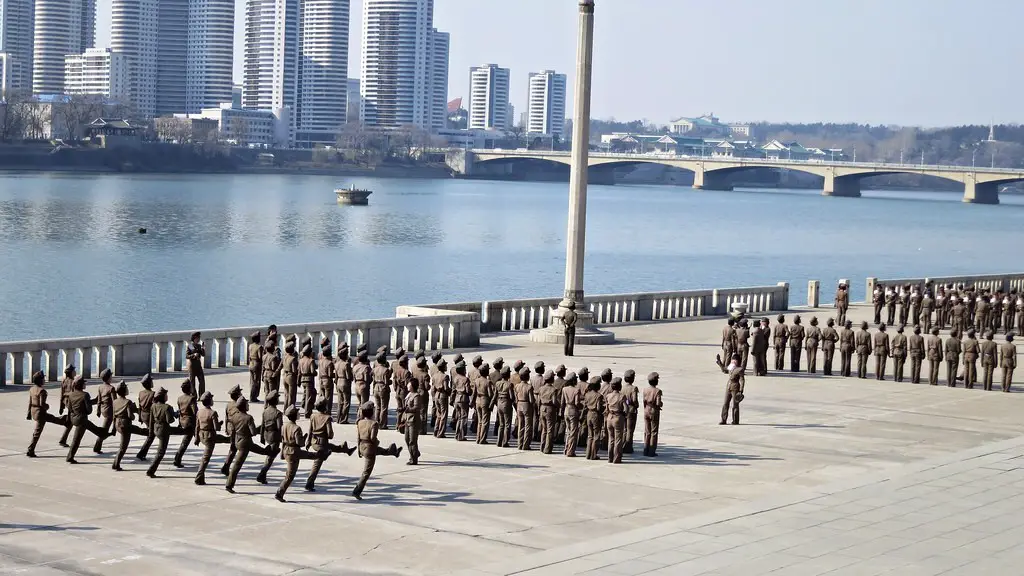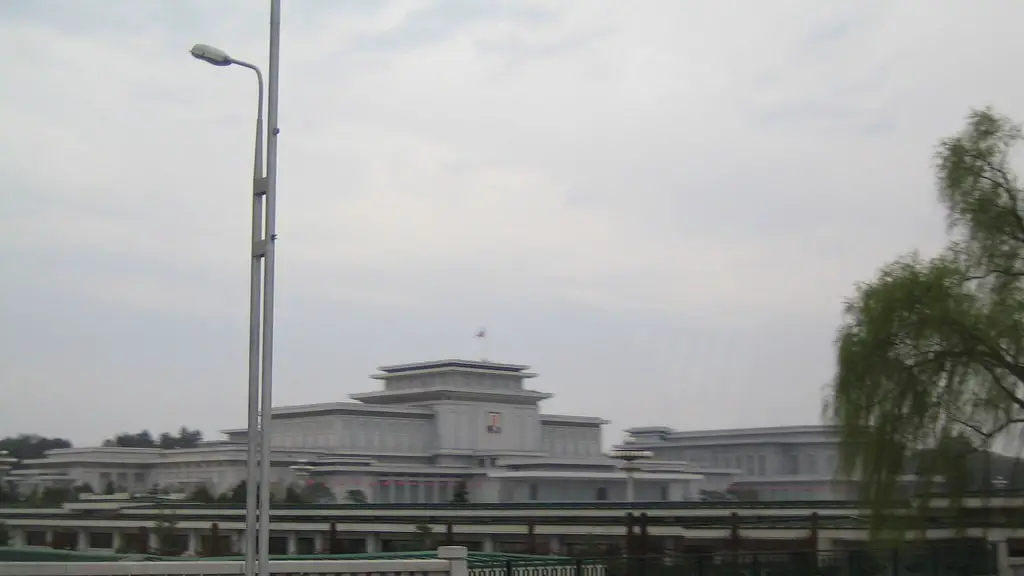Background: North Korea and South Korea
North and South Korea have been in conflict since the 1950’s, when the Korean War divided the peninsula into two separate countries (Park, 2019). Despite years of negotiations, no peace agreement has been reached, and the two countries remain technically at war. North Korea is a one-party state with a command economy, while South Korea is a democracy and has a market economy (Lankov, 2017). North Korea is highly dependent on foreign aid, while South Korea is the world’s 8th largest trading country (Tucker, 2018). Though the two countries share a common language and culture, South Korea is highly industrialized and has a much higher standard of living than North Korea (Lankov, 2017). North Korea is a nuclear-armed nation and poses a threat to South Korea’s security.
When Will North Korea Invade South Korea?
Despite ongoing tensions, a full-scale North Korean invasion of South Korea is highly unlikely (Tucker, 2018). It is possible that a series of smaller-scale military operations could be undertaken, such as cross-border skirmishes or the bombing of targets inside South Korea (Lankov, 2017). However, even this is unlikely as North Korea knows that it would face a devastating retaliatory strike from the South and its regional allies if it were to launch such an attack (Tucker, 2018).
North Korea’s nuclear weapons are seen as one of the main deterrents to a full-scale invasion (Lankov, 2017). North Korean leaders are keenly aware that any act of aggression could lead to an all-out nuclear war, and this is seen as a powerful disincentive to launching an attack (Tucker, 2018). North Korea also views its nuclear arsenal as an important bargaining chip to be used in international negotiations (Park, 2019).
North Korea also relies heavily on foreign aid, particularly from China, and would be reluctant to risk losing this aid by launching a full-scale invasion (Tucker, 2018). Chinese leaders have publicly warned North Korea against taking any aggressive action and have stated that they would not condone it (Lankov, 2017). Furthermore, the international community, including the United Nations and the United States, have issued multiple warnings against any provocative actions (Park, 2019).
Ultimately, the decision to launch an invasion will be up to the North Korean leadership. As long as the regime views a full-scale war as too costly and too risky, it is unlikely that they would try to invade South Korea.
Economic Relations between North and South Korea
The economic relationship between North and South Korea is limited, but there are some business ties (Lankov, 2017). South Korean companies are permitted to invest in some joint venture projects in North Korea, and there have been several inter-Korean economic agreements, such as the Kaesong industrial complex (Park, 2019). However, economic ties between the two countries are still subject to external sanctions (Lankov, 2017). These sanctions have resulted in the stifling of many economic activities between the two countries, which has strained their relationship further (Park, 2019).
North Korea does not currently have any foreign debt and has consistently run a trade surplus since the 1990’s (Tucker, 2018). However, its economy has been in decline since the late 1990’s, and its citizens are suffering from poverty and malnutrition (Lankov, 2017). South Korea is one of the world’s most powerful economies, and it is clear that North Korea is in no position to challenge it (Tucker, 2018).
In recent years, there have been attempts to improve relations between the two countries, such as the 2018 Inter-Korean Summit (Park, 2019). There have been some positive developments due to these talks, such as a reduction in military tensions and the reopening of some cross-border communications channels (Lankov, 2017). However, economic ties remain limited, and it is not clear what kind of economic relations the two countries will have in the future.
International Community and North Korean Aggression
The international community views North Korea’s nuclear weapons program as a major security threat, and the U.S. in particular is determined to stop it (Park, 2019). Several international sanctions have been imposed on North Korea in recent years in an effort to bring the regime to the negotiating table (Lankov, 2017). These sanctions have had a severe impact on the North Korean people, and they are facing increasing levels of poverty and malnutrition (Tucker, 2018). North Korean leaders appear to be responding to the sanctions by becoming more belligerent, and this has increased tensions in the region (Lankov, 2017).
The international community is closely monitoring North Korea’s military activity and will take swift action to respond to any aggressive moves by the regime (Tucker, 2018). The United Nations, the U.S., and other nations have warned North Korea against taking any provocative action, and they have made it clear that they will not tolerate any military aggression against regional nations (Park, 2019).
Though North Korea may be tempted to resort to military aggression as a way to respond to the economic sanctions, it is unlikely that the international community will allow it. Any act of aggression towards South Korea would lead to swift and decisive punitive actions from the U.S. and its allies.
Political and Military Impact of North Korea’s Aggression
While a full-scale North Korean invasion of South Korea is unlikely at this time, North Korea is increasingly aggressive and the threat of military action is ever-present (Tucker, 2018). South Korea is highly concerned about the North’s military capabilities and has sought to bolster its own defences in recent years (Lankov, 2017). The South has increased its defence budget, deployed more troops along the border, and strengthened its ties with the U.S. and other regional allies (Park, 2019).
The political and military tensions between North and South Korea have also had a significant economic impact, as the two countries have become increasingly isolated (Tucker, 2018). South Korean companies are no longer allowed to invest in North Korea, and the South has imposed sanctions on the North in response to its nuclear weapons program (Lankov, 2017). This has resulted in an economic “cold war” between the two countries, with both sides refusing to do business with one another.
The political tensions between North and South Korea have also had a significant impact on regional security. North Korea’s nuclear arsenal poses a major threat to regional powers, and its increasingly aggressive military posturing has caused concern among its neighbours (Park, 2019). South Korea and its allies are constantly on high alert for any sign of a North Korean attack, and the threat of a full-scale invasion always looms in the background.
North Korea’s Motives for Invading South Korea
Though a full-scale North Korean invasion of South Korea is unlikely, it is important to consider North Korea’s motives for such an attack (Tucker, 2018). North Korea’s leaders have long viewed South Korea as an enemy, and have openly threatened to launch an invasion in the past (Lankov, 2017). It is possible that North Korean leaders may see an invasion as a means to increase their power, or as a way to get revenge for their nation’s perceived suffering at the hands of the South (Park, 2019).
North Korean leaders may also see an invasion as a way to gain international legitimacy, as they would be viewed as a serious military power rather than the isolated pariah state that they are currently viewed as (Tucker, 2018). North Korea has long sought recognition from the international community, and a successful invasion of South Korea could give it the attention that it desires (Lankov, 2017).
It is also possible that North Korea sees an invasion as a way to gain access to the South’s economic resources. A full-scale invasion could bring an end to the economic sanctions that have plagued North Korea for decades (Park, 2019). This could create an economic windfall for the North, as it would be able to access the South’s markets and resources that have been off-limits for many years (Tucker, 2018).
International Cooperation in Preventing North Korean Aggression
The international community is determined to prevent any acts of aggression from North Korea, and has sought to use diplomacy and economic sanctions to bring the rogue state to the negotiating table (Park, 2019). The United Nations, the U.S., and other countries have issued multiple warnings against any military action, and have made it clear that they will take swift action if any aggression is detected (Lankov, 2017).
The international community has also sought to increase economic cooperation between North and South Korea as a way to build trust and reduce tensions (Tucker, 2018). South Korean companies are allowed to invest in some joint venture projects in North Korea, and there have been several inter-Korean economic agreements in recent years (Park, 2019). It is hoped that increased economic ties between the two countries will lead to closer political ties and a reduction in military tensions in the region.
The international community is also monitoring North Korean military activity closely, and is prepared to take action if any aggressive moves are detected (Lankov, 2017). The U.S. and other nations have powerful military forces in the region and are trained and ready to respond to any military threat (Tucker, 2018). These forces are capable of quickly responding to any North Korean aggression, and it is hoped that this will deter North Korea from attempting any full-scale invasion.
Implications of a North Korean Invasion
A North Korean invasion of South Korea would have far-reaching consequences. It would lead to devastating loss of life and property, and could have a long-term impact on the regional security situation (Park, 2019). It could also lead to an all-out nuclear war, as North Korea is known to be a nuclear-armed nation (Lankov, 2017). This would create a grave humanitarian crisis for the people of the region, as well as the world.
Furthermore, a North Korean invasion would be economically devastating for both North and South Korea. South Korea is one of the world’s largest economies, and an invasion would almost certainly disrupt its economy, leading to manufacturing delays, supply chain disruption, and instability in the markets (Tucker, 2018). North Korea would be affected as well, as it relies heavily on foreign aid and the goodwill of the international community (Park, 2019). Any act of aggression towards South Korea would lead to swift and decisive punitive action from the international community that could destroy North Korea’s fragile economy.
An invasion would also have serious political consequences. South Korea is an important U.S. ally, and an invasion would likely pull the U.S. into a direct military confrontation with North Korea. This could have devastating implications for global security as the U.S. is the most powerful nation in the world, and any escalation could quickly spin out of control.
In conclusion, a full-scale North Korean invasion of South Korea is highly unlikely at this time, as North Korean leaders are keenly aware of the consequences and





